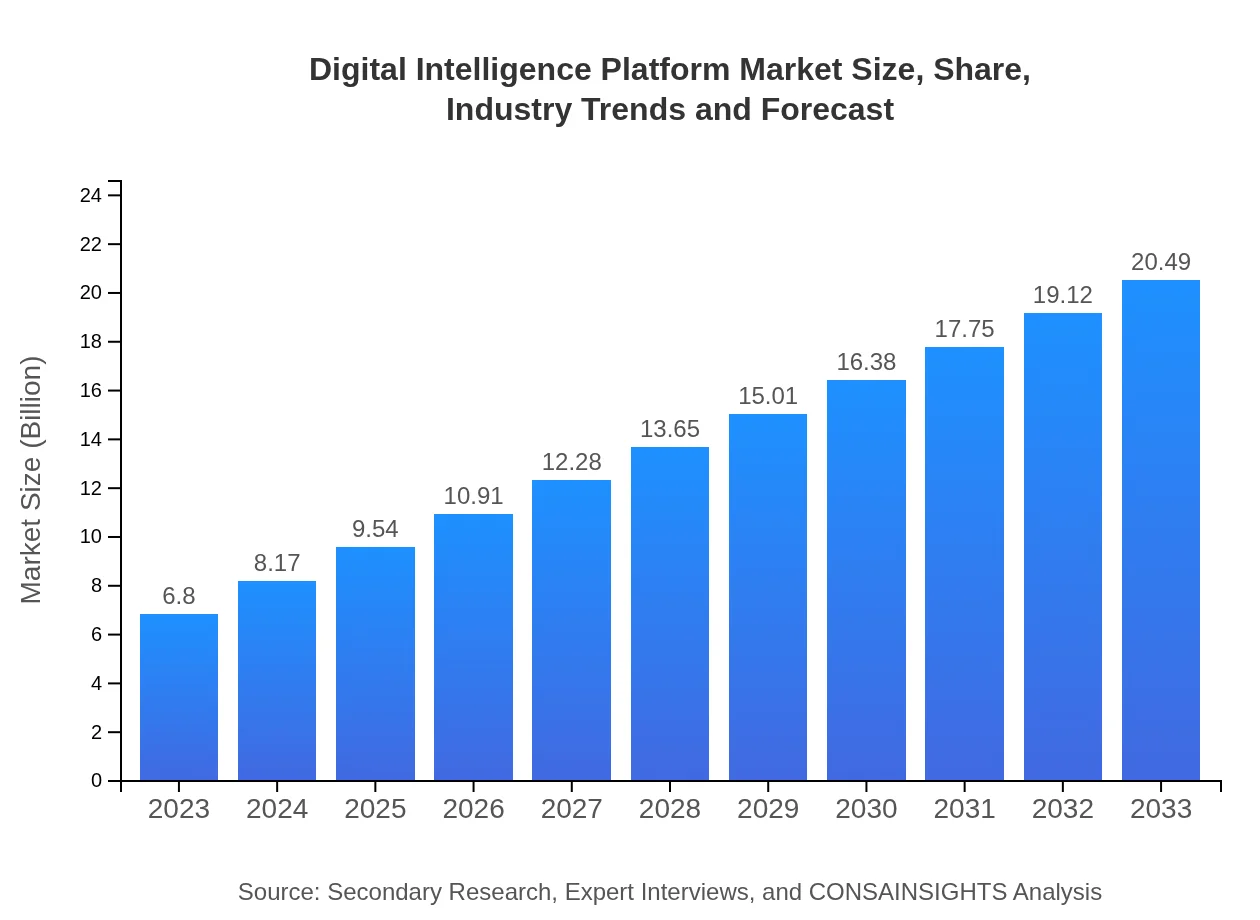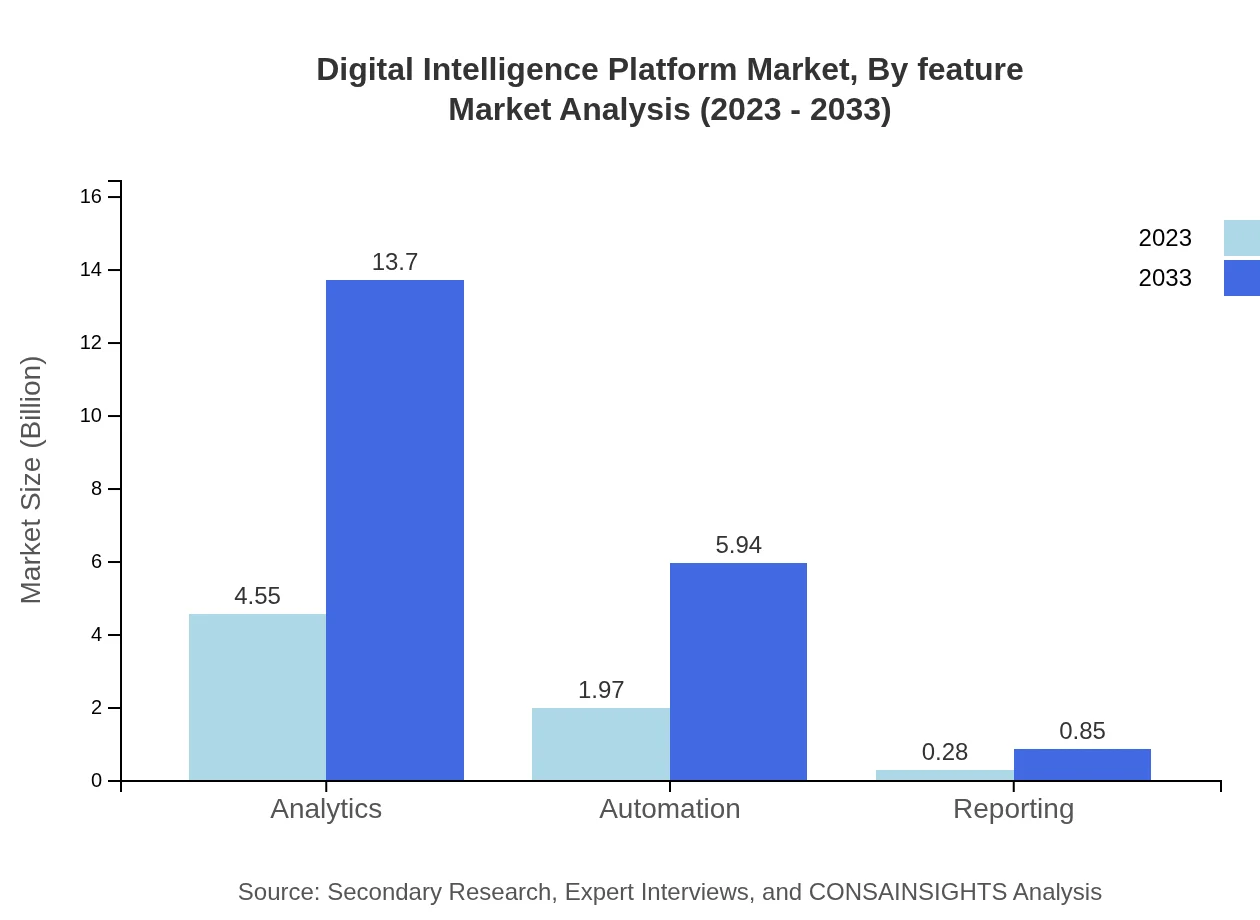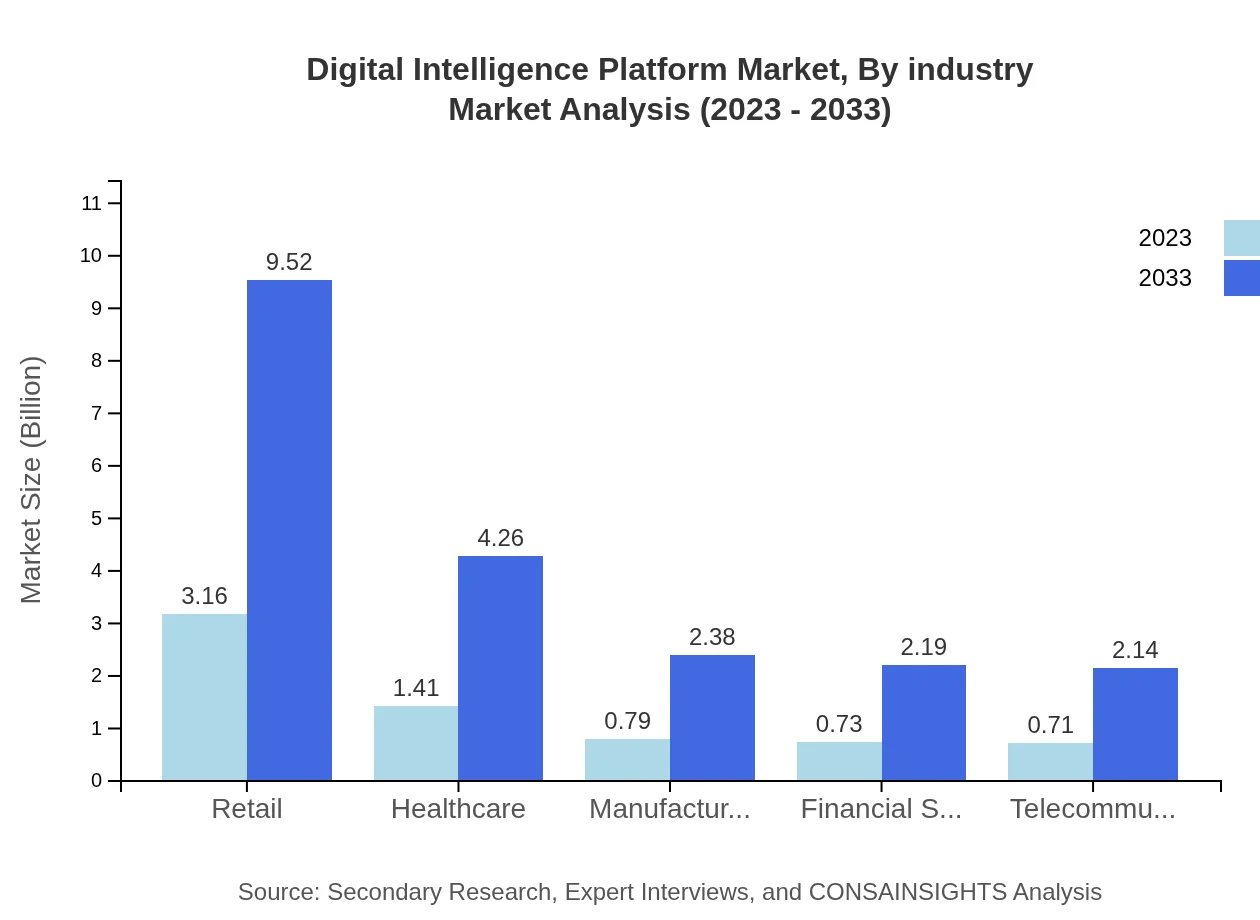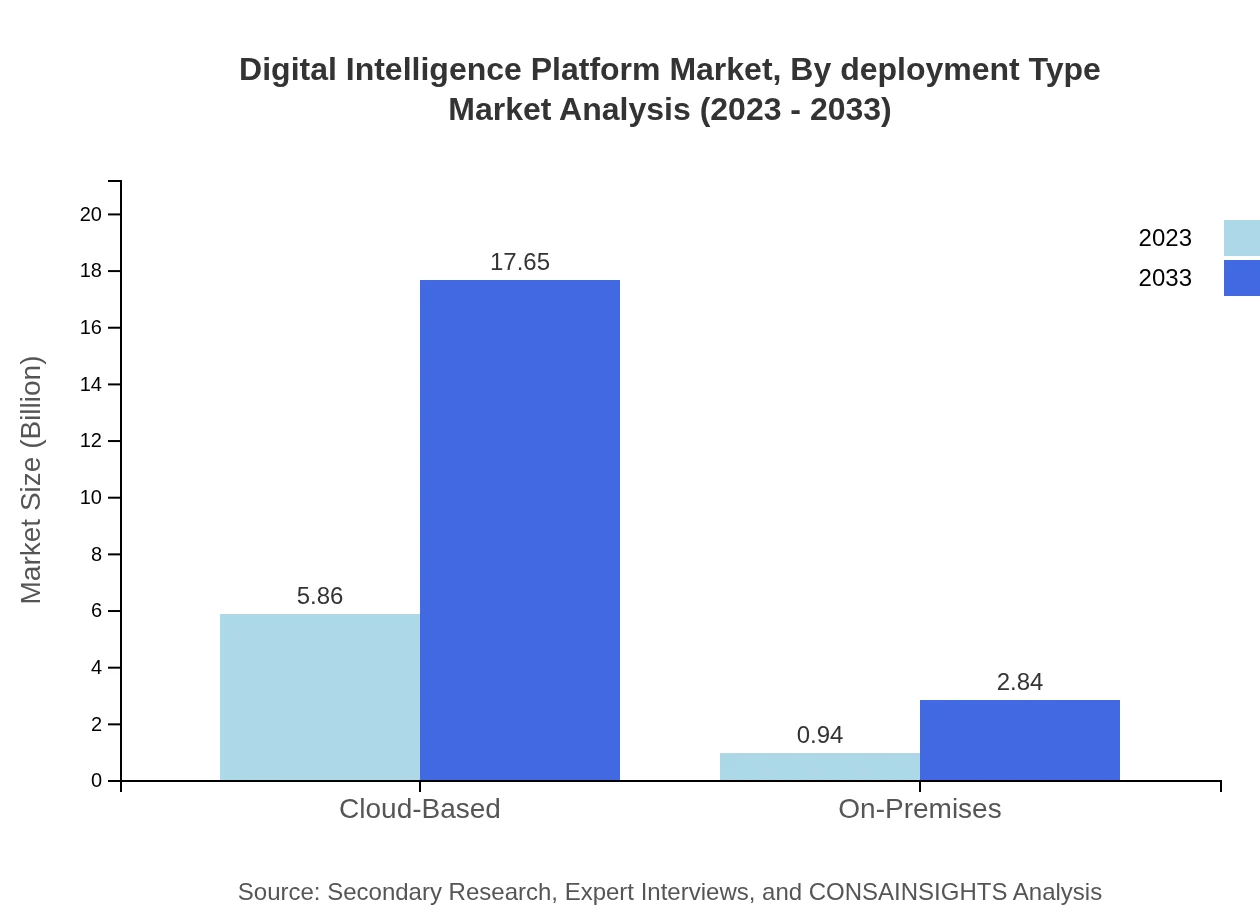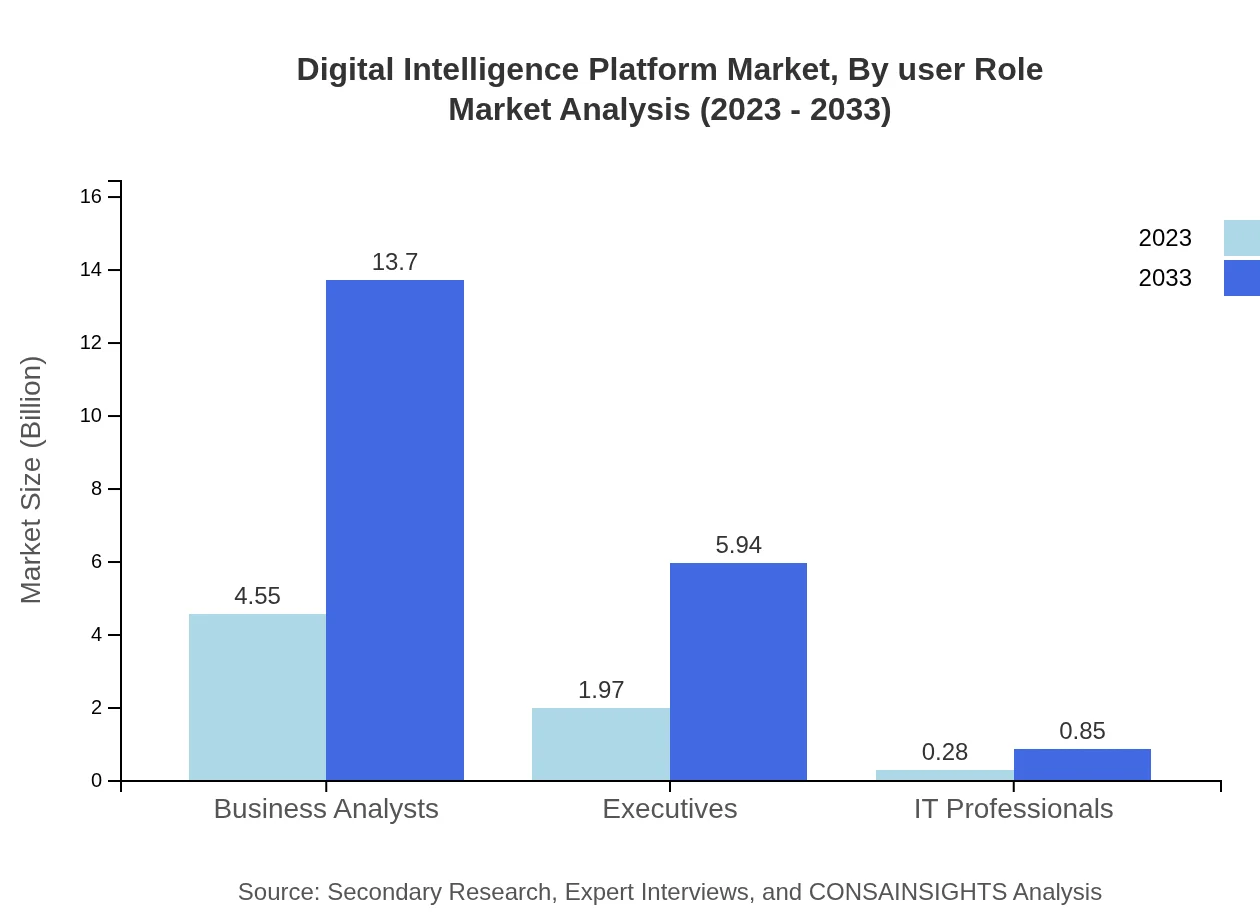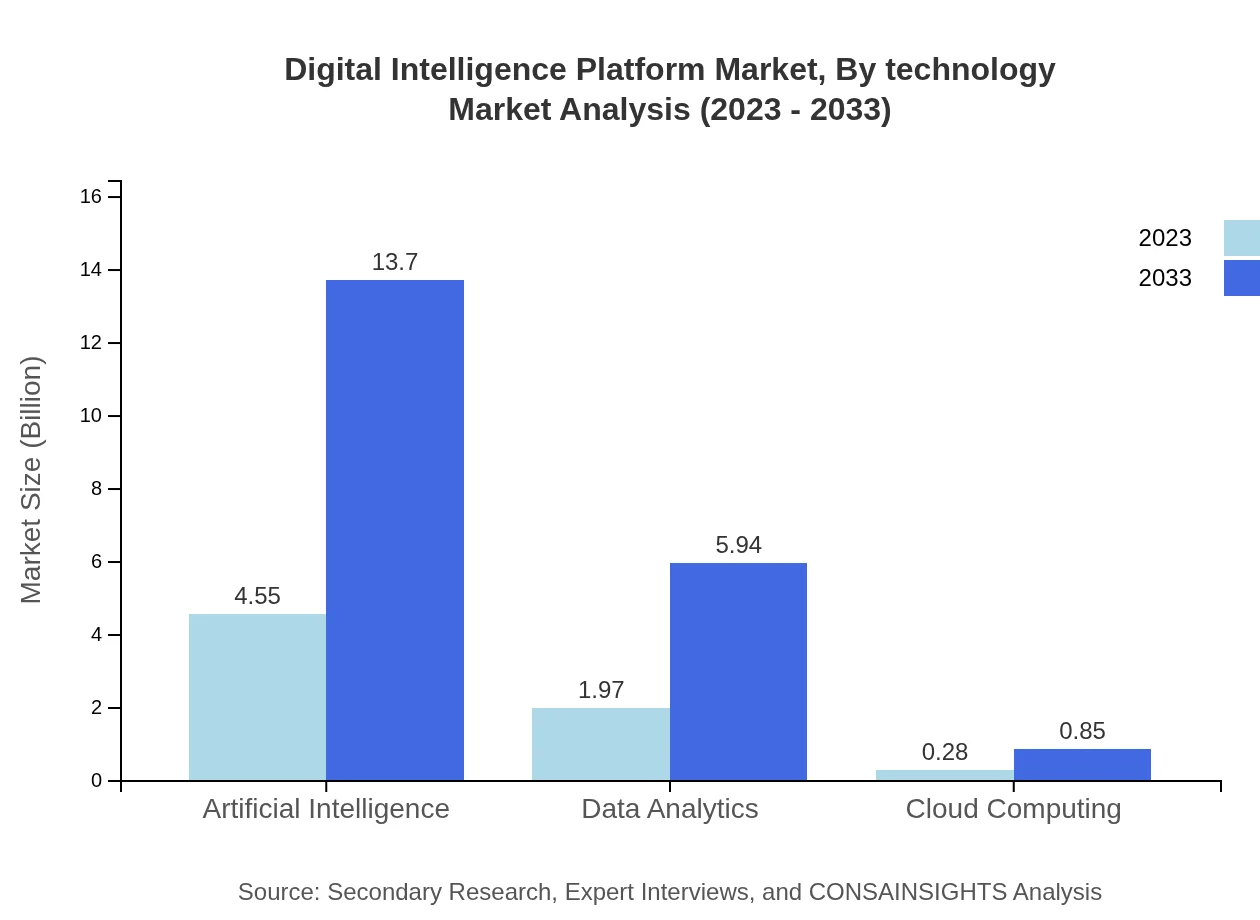Digital Intelligence Platform Market Report
Published Date: 31 January 2026 | Report Code: digital-intelligence-platform
Digital Intelligence Platform Market Size, Share, Industry Trends and Forecast to 2033
This market report provides a comprehensive analysis of the Digital Intelligence Platform, covering market dynamics, segmentation, regional insights, and future trends from 2023 to 2033. It aims to equip stakeholders with valuable data to make informed decisions.
| Metric | Value |
|---|---|
| Study Period | 2023 - 2033 |
| 2023 Market Size | $6.80 Billion |
| CAGR (2023-2033) | 11.2% |
| 2033 Market Size | $20.49 Billion |
| Top Companies | IBM, SAP, Microsoft, Salesforce |
| Last Modified Date | 31 January 2026 |
Digital Intelligence Platform Market Overview
Customize Digital Intelligence Platform Market Report market research report
- ✔ Get in-depth analysis of Digital Intelligence Platform market size, growth, and forecasts.
- ✔ Understand Digital Intelligence Platform's regional dynamics and industry-specific trends.
- ✔ Identify potential applications, end-user demand, and growth segments in Digital Intelligence Platform
What is the Market Size & CAGR of Digital Intelligence Platform market in 2023?
Digital Intelligence Platform Industry Analysis
Digital Intelligence Platform Market Segmentation and Scope
Tell us your focus area and get a customized research report.
Digital Intelligence Platform Market Analysis Report by Region
Europe Digital Intelligence Platform Market Report:
The European market is valued at USD 1.65 billion in 2023, expected to grow to USD 4.96 billion by 2033. Stringent EU regulations pushing organizations towards compliance and enhanced data management strategies contribute to market growth in this region.Asia Pacific Digital Intelligence Platform Market Report:
The Asia Pacific region is witnessing significant growth in the Digital Intelligence Platform market, with a value projected at USD 1.39 billion in 2023, expected to reach USD 4.17 billion by 2033. This growth is attributed to rapid technological adoption and a surge in data generation in countries like China and India, making it a critical region for digital analytics solutions.North America Digital Intelligence Platform Market Report:
North America holds a substantial share of the Digital Intelligence Platform market, valued at USD 2.56 billion in 2023 and projected to reach USD 7.72 billion by 2033. The region experiences high demand due to technological advancements and a strong presence of key market players focused on innovation.South America Digital Intelligence Platform Market Report:
In South America, the market was valued at USD 0.52 billion in 2023, and it is anticipated to grow to USD 1.58 billion by 2033. Growing awareness of data-driven decision-making and investments in IT infrastructure are key factors driving this growth.Middle East & Africa Digital Intelligence Platform Market Report:
The Middle East and Africa market stands at USD 0.68 billion in 2023, projected to reach USD 2.06 billion by 2033. Increased digital transformation initiatives, particularly in the UAE and South Africa, are driving the adoption of digital intelligence platforms.Tell us your focus area and get a customized research report.
Digital Intelligence Platform Market Analysis By Feature
The analytics segment is predominant, valued at USD 4.55 billion in 2023, set to reach USD 13.70 billion by 2033. Analytics play a crucial role in enhancing decision-making capabilities. Automation follows with a value of USD 1.97 billion in 2023, anticipated to grow to USD 5.94 billion by 2033, underscoring the growing need for streamlined processes in organizations.
Digital Intelligence Platform Market Analysis By Industry
The retail sector emerges as a significant user of Digital Intelligence Platforms, valued at USD 3.16 billion in 2023, and expected to hit USD 9.52 billion by 2033. This growth reflects retailers' emphasis on personalized customer experiences. The healthcare sector is projected to grow from USD 1.41 billion to USD 4.26 billion, demonstrating the rising need for data-driven patient care solutions.
Digital Intelligence Platform Market Analysis By Deployment Type
Cloud-based solutions dominate the deployment landscape, with a market size of USD 5.86 billion in 2023 and expected to grow to USD 17.65 billion by 2033. This trend is supported by the flexibility and scalability that cloud solutions offer. On-premises deployment, valued at USD 0.94 billion, is likely to reach USD 2.84 billion, catering to companies with specific data governance needs.
Digital Intelligence Platform Market Analysis By User Role
Business analysts represent the most significant user role, with a market size of USD 4.55 billion in 2023, projected to grow to USD 13.70 billion by 2033. Executives also hold a crucial role, valued at USD 1.97 billion in 2023 and forecasting to reach USD 5.94 billion, emphasizing the need for strategic decision-making based on advanced analytics.
Digital Intelligence Platform Market Analysis By Technology
Artificial intelligence comprises a substantial share of the market, with a size of USD 4.55 billion in 2023 and an anticipated growth to USD 13.70 billion by 2033. The integration of AI technologies enhances predictive analytics and automation, significantly impacting business efficiency.
Digital Intelligence Platform Market Trends and Future Forecast
Tell us your focus area and get a customized research report.
Global Market Leaders and Top Companies in Digital Intelligence Platform Industry
IBM:
IBM offers comprehensive analytics, automation, and data management solutions that empower businesses to become more insightful and agile in their operations.SAP:
SAP provides a suite of applications and analytics cloud solutions that enable organizations to transform their data into valuable insights while enhancing operational efficiency.Microsoft:
Microsoft's Azure platform offers numerous tools and services geared towards enhancing data intelligence, analytics, and machine learning for businesses worldwide.Salesforce:
Salesforce specializes in customer relationship management solutions that leverage data intelligence for better customer engagement and insights.We're grateful to work with incredible clients.









FAQs
What is the market size of digital Intelligence Platform?
The digital intelligence platform market is valued at $6.8 billion in 2023 and is projected to grow at a CAGR of 11.2% over the next decade, reaching significant heights as industries embrace data-driven decision-making.
What are the key market players or companies in this digital Intelligence Platform industry?
Key players in the digital intelligence platform industry include tech giants like IBM, Microsoft, and Salesforce, offering leading-edge solutions for analytics, automation, and reporting that cater to a wide array of business needs.
What are the primary factors driving the growth in the digital Intelligence Platform industry?
The growth of the digital intelligence platform industry is driven by increasing data generation, the adoption of AI technologies, enhanced analytics capabilities, and the need for businesses to leverage data for competitive advantage.
Which region is the fastest Growing in the digital Intelligence Platform?
In the digital intelligence platform market, North America is the fastest-growing region, with a market size expected to rise from $2.56 billion in 2023 to $7.72 billion by 2033, driven by technological advancements and innovation.
Does ConsaInsights provide customized market report data for the digital Intelligence Platform industry?
Yes, ConsaInsights offers tailored market report data for the digital intelligence platform industry, accommodating specific business requirements and providing deeper insights tailored to client needs.
What deliverables can I expect from this digital Intelligence Platform market research project?
From this digital intelligence platform research project, you can expect detailed reports, market analysis, trend forecasts, competitive analysis, and customized insights that aid in strategic decision-making.
What are the market trends of digital Intelligence Platform?
Current trends in the digital intelligence platform market include the rise of cloud-based solutions, increasing focus on automation, enhanced data analytics capabilities, and the integration of AI technologies.

